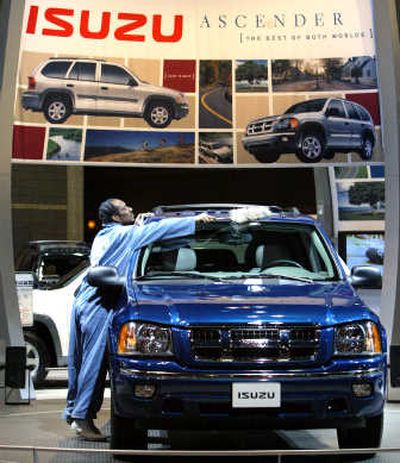Isuzu exiting U.S. car market

No lie, Isuzu is outta here.
The Japanese automaker, famous for its commercials featuring a less-than-honest salesman, said Wednesday it would stop selling passenger vehicles in the U.S., as sales declined to almost nothing in recent years.
The move, effective one year from Thursday, marks the end of a 27-year run here and makes Isuzu the first Asian car company to abandon the world’s largest market since Korea’s bankrupt Daewoo stopped selling here in 2002.
While Isuzu’s U.S. sales were paltry of late – it made just 7,098 of the 16.1 million new vehicles sold in the country last year – the company’s influence on the industry, as innovator and promoter of sport utility vehicles such as the Trooper and the Rodeo in the 1980s and ‘90s, was huge.
“It’s a shame,” said Rebecca Lindland, of automotive researcher Global Insight. “From a historical perspective, they were quite significant. Isuzu was almost ahead of its time.”
News of the decision surprised many at the company’s U.S. headquarters arm in Cerritos, Calif., as well as its network of 199 American dealers. “I’m still digesting all the information,” said Isuzu Motors America spokesman Chip Letzgus, who said the company’s U.S. president, Terry Maloney, spent Wednesday talking with employees and dealers about the news.
The decision to cease distribution was based in part on the fact that the two models Isuzu currently sells here, the Ascender SUV and the i-series pickup (both manufactured by General Motors for Isuzu), no longer will be made, and the company has no plans to design a new vehicle.
Isuzu instead will focus on its commercial trucks, a larger business in the U.S. and abroad. One individual who wasn’t surprised to hear the news was Joe Isuzu himself.
David Leisure, who portrayed the sleazy car salesman in a series of Isuzu ads in the late 1980s and early ‘90s, said he hadn’t seen an Isuzu on the road for years. “I thought they already had stopped selling here.”
Joe Isuzu, meanwhile, made Isuzu a popular brand. After building pickups for GM in the 1970s, Isuzu began selling its own vehicles in the U.S. in 1981, with low-cost vehicles such as the Pup pickup and the Trooper. Aside from the Jeep Cherokee, the Trooper was the only four-door SUV available for years and helped build a market for what would become a hugely successful category.
The company’s U.S. sales peaked at 127,630 vehicles in 1986, according to AutoData. But as other carmakers entered the SUV market, Isuzu lost its position as an SUV innovator, instead focusing on producing sedans, favoring joint-venture deals with Subaru and other carmakers, and selling Rodeo SUVs to Honda, which rebadged them as Passports.
By 1997, sales were down to 91,483 units, and introductions of new models such as the Axiom and Ascender did little to halt the slide. Its 2007 volume was the smallest of any Asian carmaker in the U.S.
“The cost of maintaining an Isuzu consumer brand simply didn’t justify the volume sold,” said Jesse Toprak, industry analyst at Edmunds.com.